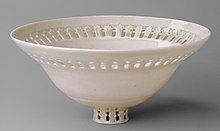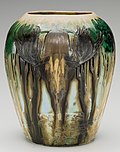Adelaide Alsop Robineau
This article's lead section may be too short to adequately summarize the key points. (December 2024) |
Adelaide Alsop Robineau | |
|---|---|
 Robineau at work on Scarab Vase, c. 1910 | |
| Born | Adelaide Alsop 1865 Middletown, Connecticut, U.S. |
| Died | 1929 (aged 63–64) Syracuse, New York, U.S. |
| Known for | studio pottery |
| Notable work | Scarab Vase, 1910 |
| Movement | American art pottery |
| Spouse | Samuel E. Robineau |
Adelaide Alsop Robineau (1865–1929) was an American china painter and potter, and is considered one of the top ceramists of American art pottery in her era.[1][2][3]
Early life and education
[edit]Adelaide Alsop was born in 1865 in Middletown, Connecticut.[4] She developed an early interest in both drawing and the then–popular pursuit of china painting. As a young woman, she helped to support her family by teaching drawing at the boarding school where she had formerly been a student.[5] During one summer break, she enrolled in the painter William Merritt Chase's summer school, her only experience of advanced training in painting and drawing.[5] She later studied ceramics with Charles Binns at Alfred University and with Taxile Doat.[6]
In 1899, she married Samuel E. Robineau, a French ceramics expert who was at one time editor of Old China magazine.[5][6] The couple had three children.[6]
Pottery
[edit]
In 1899, Robineau and her husband launched Keramic Studio, a periodical for potters and ceramic artists that continued in print until 1919.[6] Within a few years, Robineau became the magazine's sole editor.[5] Around the same time, the couple moved to Syracuse, New York, where their house was designed by architect Katharine Budd. Robineau later built a ceramic studio next to the house. She taught china painting and pottery at her Four Winds Pottery School and sold her painted china, watercolors, and ceramics.[5]
Robineau began seriously making ceramics around 1901, by which time she already had a reputation as a china painter.[5] She became convinced that painting over the glaze — then a common technique — was the wrong approach and began to experiment with other procedures.[5] She worked primarily in porcelain, experimenting with American clays to create a true high-fire porcelain.[5] She also experimented with a wide range of forms, decorations, and glazes, with frequent use of multicolored, opalescent, and iridescent glazes.[5] Her mature work shows Art Nouveau and Japonisme influences in the use of stylized botanical and animal elements.[5] At a time when many noted china painters worked with blanks made by other people, she handled all phases of the process herself, from forming the pots to incising and painting them.[6] Some of the detail work on her pieces was so fine that she employed crochet needles and dental tools to get the desired effect.[2]
Many of Robineau's works are containers, including her most famous work, the Scarab Vase, a tall, incised porcelain vase that took over 1000 hours to make.[6] In 2000, Art & Antiquities magazine named it the most important piece of American ceramics of the last hundred years.[1]
Robineau taught at both Syracuse University (1920–1929) and the Art Academy of People's University, an institution founded by Edward Gardner Lewis in Missouri.[6]
Before her death in 1929, she designed a cinerary urn that now holds the ashes of both Robineau and her husband in Syracuse, New York.[2][7]
Her work is in the collections of the Metropolitan Museum of Art, Everson Museum of Art,[8] Detroit Institute of Arts,[9] Cranbrook Art Museum,[7] and other institutions.
-
Porcelain vase, c. 1905
-
Vase with moose, c. 1907-08
-
Group of porcelain vases at a 1913 Chicago Art Institute exhibition, with Scarab Vase at top center
-
Bottle, 1926
-
Vase, 1927
-
Porcelain vase, 1928
References
[edit]- ^ a b Tapp, Barbara S., ed. "Top Treasures of the Century." Art & Antiques special issue, March 2000.
- ^ a b c Kirst, Sean (May 13, 2006). "Adelaide Robineau, Syracuse ceramist: In her prime, 'best in the Western world'". Syracuse.com.
- ^ Rago, David (2016-04-18). "Antiques Roadshow | PBS". Antiques Roadshow | PBS. Retrieved 2019-09-05.
Adelaide Alsop Robineau was arguably the most important single figure in early 20th-century decorative arts. Where most potters and potteries were working in earthenware, she explored the depths and redefined the heights of porcelain.
- ^ "Adelaide Alsop Robineau". Encyclopædia Britannica, 1911.
- ^ a b c d e f g h i j Shrimpton, Louise (January 1910). "An Art Potter and Her Home". Good Housekeeping. Vol. 50, no. 1. pp. 57–63.
- ^ a b c d e f g Bell, Barbara Nicholson. "Adelaide Alsop Robineau, Master Ceramist". Syracuse Then and Now. Archived from the original on November 22, 2017. Retrieved March 9, 2017.
- ^ a b "Adelaide Alsop Robineau - A Collection of Thirty-Four Vases and Jars - 1909-28". Cranbrook Art Museum. 17 February 2016. Retrieved 2019-09-05.
Born 1865, Middletown, Connecticut; died 1929, Syracuse, New York
- ^ "Object of the Week: Adelaide Alsop Robineau's Scarab Vase". Everson Museum. 2018-01-18. Archived from the original on 2021-05-15. Retrieved 2019-09-05.
- ^ "Adelaide Alsop Robineau, Indian Vase, 1913". www.dia.org. Retrieved 2019-09-05.
Further reading
[edit]- Weiss, Peg, ed. Adelaide Alsop Robineau: Glory in Porcelain. Syracuse University Press, 1981.
External links
[edit] Media related to Adelaide Alsop Robineau at Wikimedia Commons
Media related to Adelaide Alsop Robineau at Wikimedia Commons- Complete digitized set of Keramic Studio, hosted by the Smithsonian Institution
- Missouri Remembers Artist Database
- 1865 births
- 1929 deaths
- American potters
- Arts and Crafts movement artists
- Artists from Syracuse, New York
- Syracuse University faculty
- American women ceramists
- American women potters
- 20th-century American ceramists
- 20th-century American artists
- 20th-century American women painters
- 20th-century American painters
- People from Middletown, Connecticut
- Ceramists from Connecticut
- American women academics
- Ceramists from New York (state)






